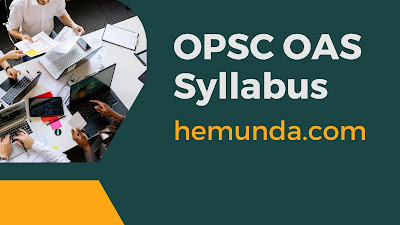OPSC OAS Prelim Exam Syllabus
The preliminary examination consists of two papers of objective type questions i.e multiple-choice questions. Each paper will be of 2 hours duration.
Paper-1 General studies 200marks (100 questions)
Paper-2 General studies 200 marks(80 questions)
DETAILED SYLLABUS
Paper-1 General studies.
1.Current events of national and international importance.
2.History of India and Indian national movements.
1.Current events of national and international importance.
2.History of India and Indian national movements.
3.History of Odisha and Odia Nationalism
4.Indian & Odisha Geography – Physical, Social, Economic Geography of India & the World.
5.Indian polity and governance-Constitution, political system, Panchayati raj, public policy, Rights Issues, etc.
5.Economic and Social development-sustainable development, poverty, inclusion, Demographics, Social Sector initiatives, etc.
7.General issues on Environmental Ecology, Bio-diversity, and climate change that don't require subject specialization.
8.General science
Paper-2 general studies(CSAT-Civil service aptitude test)
1.Comprehension.
2.Interpersonal skills including communication skills.
3.Logical reasoning and Analytical ability.
4.Decision making and problem-solving.
5.General mental ability.
6.Basic numeracy(numbers and their relations, orders of magnitude)(Class-X level).Data interpretation(charts,graphs,tables,data sufficiency etc)(class-x level).
7.English language comprehension skills(class-x level).
Civil Services Main Examination consists of written examination and interview (personality test).
Civil Services Main Examination consists of following papers divided into 2 categories – qualifying & papers to be counted for merit.
Qualifying Papers Marks
Paper-A Odia Language 250
Paper-B English 250
Papers to be Counted for Merit
Paper-I Essay 250
Paper-II General Studies-I (Indian Heritage and Culture, History and Geography of the World and Society) 250
Paper-III General Studies-II (Governance, Constitution, Polity, Social Justice and International relations) 250
Paper-IV Genera Studies-III (Technology, Economic Development, Bio-diversity, Environment, Security and Disaster Management) 250
Paper-V General Studies-IV (Ethics, Integrity and Aptitude) 250
Paper-VI Optional Subject – Paper 1 250
Paper-VII Optional Subject – Paper 2 250
Sub Total (Written Test) 1750
Personality Test 250
Grand Total 2000
1. The papers on Odia language and English (Paper A and paper B) will be of qualifying nature and the marks obtained in these papers will not be counted for ranking.
2. The papers on odia language and English (Paper A and paper B) will be of Matriculation or equivalent standard.
3. The papers on Essay, General Studies and Optional Subject of only such candidates will be taken cognizance who attain 35% marks in ‘Indian Language’ and 35% in ‘English’ as minimum qualifying standards in these qualifying papers.
4. Marks obtained by the candidates for the Paper I-VII only will be counted for merit ranking.
5. The question papers for the main examination will be of conventional (essay) type and each paper will be of 3 hour duration.
6. Candidates will have the option to answer all the question papers, except the Qualifying Language Papers, Paper-A and Paper-B, in Odia or in English.
7. The question papers (other than the literature of language papers) will be set in both English & Odia only.
8. Compensatory time of twenty minutes per hour shall be permitted for the Blind candidates and the candidates with locomotor disability and cerebral palsy where dominant (writing) extremity is affected to the extent of slowing the performance of function (minimum of 40% impairment) in both the Civil Services (Preliminary) as well as in the Civil Services (Main) Examination.
The candidates capable of clearing prelims and mains will be called for the final interview. The personality test or interview shall carry 250 Marks.
Thus, hopefully, this article on the OPSC OAS syllabus will guide the aspirants regarding the subjects and topics essential for clearing this exam. They can quickly clear this exam if they start preparing topic wise and set proper targets.
For the Best preparation strategy for OAS exams, candidates can visit the linked article and get detailed study material and preparation tips to excel in the examination.
Aspirants who shall be appearing for the exam for the first time and are willing to get some preparation tips and study material for the competitive exams can turn to HEMUNDA for assistance.
Odia language is a compulsory paper in the OPSC OAS exam. However, the other papers can be written a in English or Odia according to your choice. Read the article for more clarity.
According to OPSC, the candidates must be between 18 and 38 years of age. However, there is age relaxations for some categories.
4.Indian & Odisha Geography – Physical, Social, Economic Geography of India & the World.
5.Indian polity and governance-Constitution, political system, Panchayati raj, public policy, Rights Issues, etc.
5.Economic and Social development-sustainable development, poverty, inclusion, Demographics, Social Sector initiatives, etc.
7.General issues on Environmental Ecology, Bio-diversity, and climate change that don't require subject specialization.
8.General science
Paper-2 general studies(CSAT-Civil service aptitude test)
1.Comprehension.
2.Interpersonal skills including communication skills.
3.Logical reasoning and Analytical ability.
4.Decision making and problem-solving.
5.General mental ability.
6.Basic numeracy(numbers and their relations, orders of magnitude)(Class-X level).Data interpretation(charts,graphs,tables,data sufficiency etc)(class-x level).
7.English language comprehension skills(class-x level).
Aspiring OPSC candidates are advised to read NCERT books and other important notes:
OAS Prelim History Past Questions With Explanations
Previous Years' OAS Prelim Exam Questions with Explanations For General Issues of Environmental Ecology, Biodiversity & Climate Change
OAS Prelim Exam Previous years Polity Questions With Explanations
50 Probable Current Affairs Questions With Explanations For OAS Prelim Exam From January,2022 to July 2022
OAS Prelim Exam Geography Previous Years Questions with Explanation
Previous Years' OAS Prelim Exam Questions with Explanations For General Issues of Environmental Ecology, Biodiversity & Climate Change
OAS Prelim Exam Previous years Polity Questions With Explanations
50 Probable Current Affairs Questions With Explanations For OAS Prelim Exam From January,2022 to July 2022
OAS Prelim Exam Geography Previous Years Questions with Explanation
OPSC OAS Main Exam Pattern & Syllabus
Civil Services Main Examination consists of written examination and interview (personality test).
Civil Services Main Examination consists of following papers divided into 2 categories – qualifying & papers to be counted for merit.
Qualifying Papers Marks
Paper-A Odia Language 250
Paper-B English 250
Papers to be Counted for Merit
Paper-I Essay 250
Paper-II General Studies-I (Indian Heritage and Culture, History and Geography of the World and Society) 250
Paper-III General Studies-II (Governance, Constitution, Polity, Social Justice and International relations) 250
Paper-IV Genera Studies-III (Technology, Economic Development, Bio-diversity, Environment, Security and Disaster Management) 250
Paper-V General Studies-IV (Ethics, Integrity and Aptitude) 250
Paper-VI Optional Subject – Paper 1 250
Paper-VII Optional Subject – Paper 2 250
Sub Total (Written Test) 1750
Personality Test 250
Grand Total 2000
Important Points:
1. The papers on Odia language and English (Paper A and paper B) will be of qualifying nature and the marks obtained in these papers will not be counted for ranking.
2. The papers on odia language and English (Paper A and paper B) will be of Matriculation or equivalent standard.
3. The papers on Essay, General Studies and Optional Subject of only such candidates will be taken cognizance who attain 35% marks in ‘Indian Language’ and 35% in ‘English’ as minimum qualifying standards in these qualifying papers.
4. Marks obtained by the candidates for the Paper I-VII only will be counted for merit ranking.
5. The question papers for the main examination will be of conventional (essay) type and each paper will be of 3 hour duration.
6. Candidates will have the option to answer all the question papers, except the Qualifying Language Papers, Paper-A and Paper-B, in Odia or in English.
7. The question papers (other than the literature of language papers) will be set in both English & Odia only.
8. Compensatory time of twenty minutes per hour shall be permitted for the Blind candidates and the candidates with locomotor disability and cerebral palsy where dominant (writing) extremity is affected to the extent of slowing the performance of function (minimum of 40% impairment) in both the Civil Services (Preliminary) as well as in the Civil Services (Main) Examination.
Note on Number of Attempts
Due to changes in the examination pattern in above manner will require time for candidates to adapt to the revised pattern of the examination. As such it has been proposed to revise the attempt to appear the examination in the following manner; "(0 for candidates belonging to Unreserved Category - 6 (Six) attempts. (ii) no limit has been prescribed for candidates belonging to S.C. & S. T. category. (iii) for candidates belonging to the Socially and Educationally Back Ward Classes -9 (Nine) attempts. 4. It is therefore, proposed to amend the relevant provisions of the Odisha Civil Services (Combined Competitive Recruitment Examination) Rules, 1991.
Syllabus of OPSC Main Examination Papers
OPSC OAS Syllabus 2023- Mains: ଆଶାକର୍ମୀମାନେ OPSC OAS Syllabus 2023 PDF ଡାଉନଲୋଡ୍ କରିପାରିବେ କିମ୍ବା OPSC OAS Syllabus 2023 ବିବରଣୀ ଯାଞ୍ଚ କରିପାରିବେ |OPSC OAS Syllabus ଜରୁରୀ, ଯେହେତୁ ଆଶାକର୍ମୀମାନେ ଗୁରୁତ୍ୱପୂର୍ଣ୍ଣ ବିଷୟଗୁଡିକ ଜାଣିବା ଆବଶ୍ୟକ କରନ୍ତି | ଥରେ ସେମାନେ ଏହା ଜାଣିବା ପରେ, ସେମାନେ ଏହି ପରୀକ୍ଷା ବିଷୟରେ ଅଧିକ ଆତ୍ମବିଶ୍ୱାସୀ ହୋଇପାରନ୍ତି |
The pattern of questions would be broadly as follows:
English Language:
(i) Comprehension of given passages.
(ii) Precis Writing.
(iii) Usage and Vocabulary & Grammar
(iv) Short Essays.
(v) Translation from Odia to the English Language
Candidates may be required to write essays on multiple topics.
They will be expected to keep closely to the subject of the essay to arrange their ideas in orderly fashion, and to write concisely.
Credit will be given for effective and exact expression.
III. Paper-II: General Studies-1: Indian Heritage and Culture, Odisha Heritage & Culture,
General Studies-II: Governance, Constitution, Polity, Social Justice and Inter-
General Studies-III: Technology, Economic Development, Bio-diversity,
General Studies-IV:
VII. Paper – VI & VII
I. Qualifying Papers on Odia Language and English
The pattern of questions would be broadly as follows:
English Language:
(i) Comprehension of given passages.
(ii) Precis Writing.
(iii) Usage and Vocabulary & Grammar
(iv) Short Essays.
(v) Translation from Odia to the English Language
Odia Languages:
(i) Comprehension of given passages.
(ii) Precis Writing.
(iii) Usage and Vocabulary & grammar
(iv) Short Essays.
(v) Translation from English to the IOdia Language
(i) Comprehension of given passages.
(ii) Precis Writing.
(iii) Usage and Vocabulary & grammar
(iv) Short Essays.
(v) Translation from English to the IOdia Language
II. Paper-I: Essay
Candidates may be required to write essays on multiple topics.
They will be expected to keep closely to the subject of the essay to arrange their ideas in orderly fashion, and to write concisely.
Credit will be given for effective and exact expression.
III. Paper-II:
General Studies-1: Indian Heritage and Culture, Odisha Heritage & Culture,
History and Geography of the World & Society
Heritage and Culture
Indian culture covering the salient aspects of Art forms, Literature and Architecture from Ancient to Modern times.
⚫ Temple Architecture of Odisha.
⚫ Socio-cultural development in Odisha.
⚫ Bhakti Movement in Odisha and its impact on the Society of Odisha.
⚫ Evolution and Growth of Odia Language and Literature and development of
Odia Literature
Regional Tradition of Odisha-Festivals.
History
⚫ Modern Indian history from about the middle of the eighteenth century until
the present-significant events, personalities, issues.
The Freedom Struggle its various stages and important contributors/
contributions from different parts of the country. Post-independence consolidation and reorganization within the country.
⚫ Kalinga War and its significance
⚫ Dynastic History of Odisha: Mahameghavahana Kharavela, The Bhauma Karas
and The Somavamsis, The Gangas and Gajapatis.
⚫ Early Resistance Movements in Odisha- Paik Rebellion, Vir Surendra Sai and
the Revolt of 1857.
• Creation of Odisha Province.
⚫ Freedom Movement and Praja Mandal Movements in Odisha; Social bases of
Odia Nationalism; Integration of Princely States in Odisha; Social reform
movements in Odisha.
Geography of India with special reference to Odisha
Physical, economic and social geography of India.
Important Geophysical phenomena such as earthquakes, Tsunami, Volcanic activity, cyclone, geographical features and their location-changes in critical geographical features (including water-bodies and ice-caps) and in flora and fauna and the effects of such changes.
⚫ Odisha's natural resources: water, forests & minerals.
⚫ Odisha's Physiography and Riverine system.
⚫Salient features of Indian society, Diversity of India and Odisha.
Role of women and women's organization, population an associated
issues, poverty and developmental issues, urbanization, their problems and remedies.
• Effects of globalization on Indian society as a whole and Odisha.
Distribution and growth of tribes and tribal population in Odisha;
Urbanization-Growth of urban population and urban centres in Odisha.
⚫ Social empowerment, communalism, regionalism & secularism.
PAPER-III
General Studies-II: Governance, Constitution, Polity, Social Justice and Inter-
State Relations
Governance, Constitution, Polity and Inter-state relations
⚫ Indian Constitution historical underpinnings, evolution, features,
amendments, significant provisions and basic structure.
Functions and responsibilities of the Union and the States, issues and
challenges pertaining to the federal structure, devolution of powers and finances up to local levels and challenges therein.
Separation of powers between various organs dispute redressal mechanisms and institutions.
Comparison of the Indian constitutional scheme with that of other countries.
• Parliament and State legislatures-structure, functioning, conduct of business, powers & privileges and issues arising out of these.
Structure, organization and functioning of the Executive and the Judiciary
Ministries and Departments of the Government; pressure groups and
formal/informal associations and their role in the Polity.
Salient features of the Representation of People's act, Odisha Right to Public
Services Act and Odisha Lokayukta Act.
Appointment to various Constitutional posts, powers, functions, and responsibilities of various Constitutional bodies.
⚫ Statutory, regulatory, and various quasi-judicial bodies.
• Important aspects of governance, transparency and accountability, e-
governance- applications, models, successes, limitations, and potential; citizens
charters, transparency & accountability, and institutional and other measures.
Role of Central and State Civil services in a democracy.
⚫ Panchayati Raj Institution (PRIS) in Odisha.
• Odisha and its neighborhood-relations.
Social Justice
⚫ Government policies and interventions for development in various sectors and issues arising out of their design and implementation-India and Odisha.
women SHGS.
the performance of these schemes; mechanisms, laws, institutions, and
⚫ Development processes and the development industry- the role of MSMES &
⚫ Welfare schemes for vulnerable sections of the population by the State and
Bodies constituted for the protection and betterment of these vulnerable sections- India and Odisha.
⚫ Issues relating to development and management of social sector/ Services relating to Health, Education, Human Resources - India and Odisha.
⚫ Issues relating to poverty and hunger-Sustainable Development Goals.
PAPER-IV
General Studies-III: Technology, Economic Development, Bio-diversity,
Environment, Security and Disaster Management
Science & Technology
⚫ Science and Technology-developments and their applications and effects in
everyday life.
⚫ Achievements of Indians in science & technology; Indigenisation of technology
and developing new technology.
⚫ Awareness in the fields of IT, Space, Computers, Robotics, Nanotechnology, Bio-technology and issues relating to intellectual property rights.
Economic Development
Indian Economy and issues relating to planning, mobilization of resources, growth, development and employment.
⚫ Inclusive growth and issues arising from it.
⚫ Government Budgeting-India and Odisha.
Land reforms in India & Odisha.
• Effects of liberalization on the economy, changes in industrial policy and their
effects on industrial growth.
⚫ Infrastructure: Energy, Posts, Roads, Airports, Railways in the Country and
Odisha.
⚫ Industrialisation in Odisha - Issues and prospects.
Agriculture
Major cropping patterns in various parts of the country, different types of
irrigation and irrigation systems storage, transport and marketing of agricultural produce and issues and related constraints; e-technology in the aid of farmers in India & Odisha.
issues related to direct and indirect farm subsidies and minimum support prices; Public Distribution System- objectives, functioning, limitations, revamping; issues of buffer stocks and food security; Technology missions;
economics of animal-rearing in India & Odisha - Doubling of Farmers' Income.
Food processing and related industries in India & Odisha - scope and significance, location, upstream and downstream requirements, supply chain management.
Biodiversity and Environment
Conservation, environmental pollution and degradation, environmental impact assessment.
Disaster and Disaster Management in the Country and in Odisha State institutions and policies on Disaster Management. Linkages between development and spread of extremism. Left wing
extremism in Odisha.
Security and Disaster Management
⚫ Challenges to internal security though communication networks, role of media
and social networking sites in internal security challenges, basics of cyber security; money-laundering and its prevention - Arts & policies relating to
Cyber Security and Money laundering.
• Security challenges and their management in border areas linkages of
organized crime with terrorism.
⚫ Various Security forces and agencies of the Country and Odisha and their mandate.
PAPER-V
General Studies-IV:
Ethics, Integrity and Aptitude
This paper will include questions to test the candidates' attitude and approach to issues relating to integrity, probity in public life and his problem-solving approach to various issues and conflicts faced by him in dealing with society. Questions may utilize the case study approach to determine these aspects. The following broad areas will be covered:
Ethics and Human Interface: Essence, Determinants and Consequences of Ethics in Human Actions; Dimension of Ethics; Ethics in Private and Public
Relationships. Human Values - Lessons from the Lives and Teachings of Great
Leaders, Reformers and Administrators; Role of Family, Society and
Educational Institutions in Inculcating Values. Attitude: Content, Structure, Function; its Influence and Relation with Thought and Behaviour; Moral and Political Attitudes; Social Influence and Persuasion.
Aptitude and Foundational Values for Civil Service, Integrity, Impartiality and Non-partisanship, Objectivity, Dedication to Public Service, Empathy, Tolerance and Compassion towards the weaker-sections.
Emotional Intelligence-Concepts, and their Utilities and Application in Administration and Governance
• Contributions of Moral Thinkers and Philosophers from India and World. Public/Civil Service Values and Ethics in Public Administration: Status and Problems; Ethical Concerns and Dilemmas in Government and Private Institutions; Laws, Rules, Regulations and Conscience as Sources of Ethical Guidance; Accountability and Ethical Governance; Strengthening of Ethical and Moral Values in Governance; Ethical Issues in International Relations and Funding; Corporate Governance.
Probity in Governance: Concept of Public Service; Philosophical Basis of Governance and Probity: Information Sharing and Transparency in Government, Right to Information, Codes of Ethics, Codes of Conduct, Citizen's Charters, Work Culture, Quality of Service Delivery, Utilization of Public Funds, Challenges of Corruption.
• Case Studies on above issues.
VII. Paper – VI & VII
Optional Subject Papers I & II.
OPTIONAL SUBJECTS FOR MAIN EXAMINATION
The total number of questions in the question papers of optional subjects will be eight. All questions will carry equal marks. Each paper will be divided into two parts, viz. Part A and Part B, each part containing four questions. Out of eight questions, five questions are to be attempted. One question in each part will be compulsory. Candidates will be required to answer three more questions out of the remaining six questions, taking at least one question from each part. In this way, at least two questions will be attempted from each part i.e. one compulsory question plus one more.
- Download New OAS Main GS Syllabus PDF
- How to prepare for Odisha Civil Services Exam [ Popularly Known as OAS Exam] Conducted by OPSC.
- Download OAS Home Science Optional Syllabus PDF
- Download OAS Sociology Optional Syllabus PDF
- Download OAS Anthropology Optional Syllabus PDF
- Download OAS Geography Optional Syllabus PDF
- Download OAS Public Administration Optional Syllabus PDF
- Download OAS Psychology Optional Syllabus PDF
- Download New OAS Main GS Syllabus PDF
- How to prepare for Odisha Civil Services Exam [ Popularly Known as OAS Exam] Conducted by OPSC.
- Download OAS Home Science Optional Syllabus PDF
- Download OAS Sociology Optional Syllabus PDF
- Download OAS Anthropology Optional Syllabus PDF
- Download OAS Geography Optional Syllabus PDF
- Download OAS Public Administration Optional Syllabus PDF
- Download OAS Psychology Optional Syllabus PDF
List of Optional Subjects for OPSC Mains Examination
The candidates must opt for two optional subjects for Main Examination. Each subject will have two papers and each paper carrying 300 marks. Request for change of Optional Subjects will not be entertained.
- Agriculture
- Animal Husbandry & Veterinary Science
- Anthropology
- Agricultural Engineering
- Botany
- Chemistry
- Civil Engineering
- Commerce & Accountancy
- Economics
- Electrical Engineering
- Education
- Fisheries Science
- Forestry
- Geography
- Geology
- Home Science
- History
- Indian Language & Literature (any 1) – Odia, Hindi, Sanskrit, English, Persian, Urdu.
- Law
- Management
- Mathematics
- Mechanical Engineering
- Philosophy
- Physics
- Political Science & International Relations
- Public Administration
- Psychology
- Sociology
- Statistics
- Zoology
Candidates shall not be allowed to opt for the following combinations of optional subjects.
- Odia, Hindi, Persian, Sanskrit, Urdu, English
- Civil Engineering, Mechanical Engineering, Electrical Engineering and Agricultural Engineering.
- Mathematics & Statistics
- Anthropology & Sociology
- Political Science & International Relations and Public Administration.
- Commerce & Accountancy and Management.
- Agriculture and Animal Husbandry & Veterinary Science.
- Management and Public Administration
- Education and Psychology
- Agriculture and Agricultural Engineering.
Read the Following Home Science Optional Notes
Diabetes Mellitus(Therapeutic nutrition) of Home Science with previous years' questions for OPSC OAS Exam
Extension Education(Home Science) tips, strategy, previous years’ question analysis according to the syllabus for opsc OAS Exam
(Home Science) Basic of Human Development for the opsc OAS Exam.
Learning and teaching in Extension Education(home science optional) for opsc OAS Exam.
Physical and Motor Development, Intellectual development (Piaget’s stages of development) Development of emotion(home science) for opsc OAS Exam.
Extension Education(Home Science) tips, strategy, previous years’ question analysis according to the syllabus for opsc OAS Exam
(Home Science) Basic of Human Development for the opsc OAS Exam.
Learning and teaching in Extension Education(home science optional) for opsc OAS Exam.
Physical and Motor Development, Intellectual development (Piaget’s stages of development) Development of emotion(home science) for opsc OAS Exam.
Personality Test or Interview
The candidates capable of clearing prelims and mains will be called for the final interview. The personality test or interview shall carry 250 Marks.
Thus, hopefully, this article on the OPSC OAS syllabus will guide the aspirants regarding the subjects and topics essential for clearing this exam. They can quickly clear this exam if they start preparing topic wise and set proper targets.
For the Best preparation strategy for OAS exams, candidates can visit the linked article and get detailed study material and preparation tips to excel in the examination.
Aspirants who shall be appearing for the exam for the first time and are willing to get some preparation tips and study material for the competitive exams can turn to HEMUNDA for assistance.
Read the Following Sociology Optional Notes
Sociology Optional,Paper-1, Chapter-4Karl Marx - Historical materialism, mode of production, alienation, class struggle
SOCIOLOGY OPTIONAL, Paper-1, Chapter-6, Social Stratification
Sociology Optional, Paper-1, Chapter-7, Social Mobility
Can I write the OAS exam in Odia?
SOCIOLOGY OPTIONAL, Paper-1, Chapter-6, Social Stratification
Sociology Optional, Paper-1, Chapter-7, Social Mobility
Frequently Asked Questions about OPSC OAS Syllabus
Odia language is a compulsory paper in the OPSC OAS exam. However, the other papers can be written a in English or Odia according to your choice. Read the article for more clarity.
What is the age limit for OAS?
According to OPSC, the candidates must be between 18 and 38 years of age. However, there is age relaxations for some categories.
For women of all categories- 43 years
SEBC Male- 43 years
ST/SC - No age bar.
Number of attempts-
Open(General) Category- 6 attempts
SEBC- 9 attempts
No limit has been prescribed for candidates belonging to S.C. & S. T. category.
For women of all categories- 43 years
SEBC Male- 43 years
ST/SC - No age bar.
Number of attempts-
Open(General) Category- 6 attempts
SEBC- 9 attempts
No limit has been prescribed for candidates belonging to S.C. & S. T. category.







































0 Comments
please do not enter any spam link in the comment box.